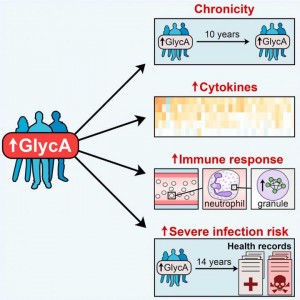New Biomarker Predicts Long-Term Risk of Infection and Death


Chronic high GlycA levels correlate with elevated cytokines, immune response, infection risk and death. Credit: Cell Systems.
GlycA levels in blood can tell whether a person has an increased risk of severe infection. The finding by researchers from the Universities of Oulu and Melbourne is based on tests performed on 10000 people. GlycA is a byproduct of inflammation that correlates with citokine levels and an increased immune response, and predicts risk of hospitalization and death by infection. The study was published in the journal Cell Systems.
Glycoprotein Acetylation (GlycA) was already known as a biomarker of cardiovascular disease, predicting death of individuals with elevated GlycA levels within five years. The finding came from the integration of available biomolecular big data and health records. Profiling of the biomarker was performed by nuclear magnetic resonance spectroscopy (NMR), a technique that allowed to identify and quantify acetylation of sugar groups in proteins present in blood. The glycoproteins that contribute to elevate the GlycA signal are known to act in the acute-phase response to infection. However, it has been shown that GlycA levels are also high in individuals with chronic inflammation, affected by hypertension, obesity and other conditions. There is currently a biomarker for chronic inflammation, circulating C-reactive protein (CRP), but its analysis is plagued with false negatives.
GlycA correlates with cytokine levels and antimicrobial response
The authors of this study thought that GlycA could be a more reliable reporter molecule than CRP. They analyzed health records from three large populations that totalled more than 11.000 individuals and crossed this information with multiple omics libraries. The researchers could establish a relationship between persistent, elevated GlycA levels and both cytokine levels -without recent infection- and neutrophil antimicrobial response. This results indicate that apparently healthy people live with chronic inflammation. Analyzing health records of individuals followed for 14 years, the researchers observed a long-term risk of severe infection -particularly, septicemia and pneumonia- for those with high GlycA levels.
The cause of the chronic inflammation is not solved in the study, but the authors outline several possible scenarios. It could be a persistent, low-intensity microbial infection; a past severe infection; an imitation of a microbial response; a combination of the above.
This study presents an innovative method for taking advantage of genomic and health data in precision medicine.
Source: EurekAlert
